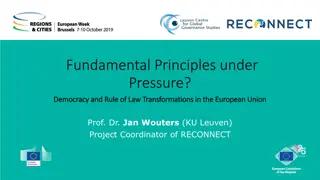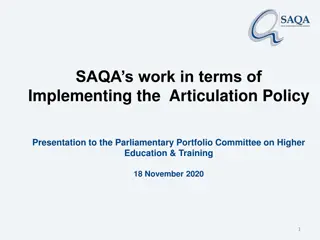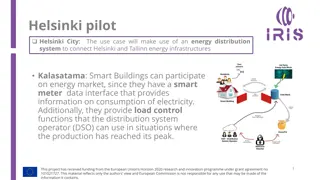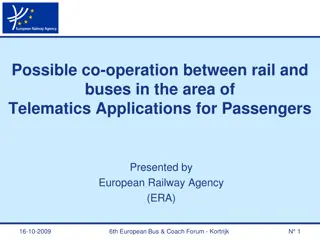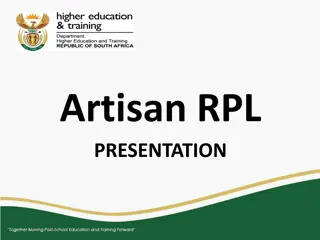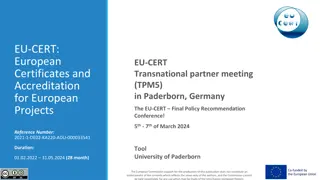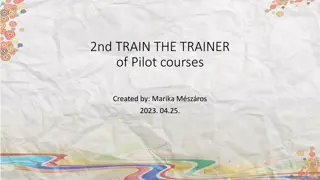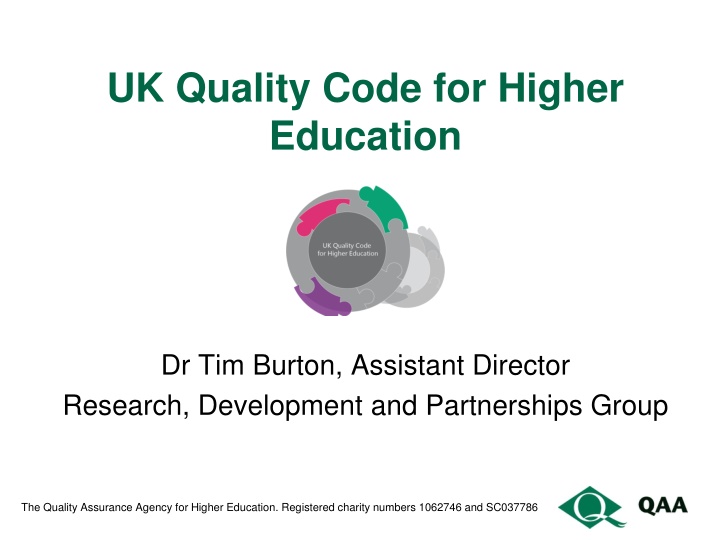
Quality Assurance Agency for Higher Education in the UK
The Quality Assurance Agency for Higher Education in the UK, led by Dr. Tim Burton, plays a crucial role in safeguarding standards and enhancing the quality of higher education. Through reviews, guidance, and investigations, the agency works to meet students' needs, safeguard standards, drive improvements, and enhance public understanding. The UK Quality Code for Higher Education sets out expectations and practices related to academic standards, quality assurance, and information provision.
Download Presentation

Please find below an Image/Link to download the presentation.
The content on the website is provided AS IS for your information and personal use only. It may not be sold, licensed, or shared on other websites without obtaining consent from the author. If you encounter any issues during the download, it is possible that the publisher has removed the file from their server.
You are allowed to download the files provided on this website for personal or commercial use, subject to the condition that they are used lawfully. All files are the property of their respective owners.
The content on the website is provided AS IS for your information and personal use only. It may not be sold, licensed, or shared on other websites without obtaining consent from the author.
E N D
Presentation Transcript
UK Quality Code for Higher Education Dr Tim Burton, Assistant Director Research, Development and Partnerships Group The Quality Assurance Agency for Higher Education. Registered charity numbers 1062746 and SC037786
The role of the Quality Assurance Agency QAA s mission is to safeguard standards and improve the quality of UK higher education We work with higher education providers to develop reference points and guidance which are used by all providers We conduct reviews and publish reports detailing the findings of those reviews We investigate concerns about a subscriber s quality and standards For more information see: www.qaa.ac.uk/aboutus
QAAs Strategy 2011-14 QAA has four strategic aims for the period 2011-14 meet students' needs and be valued by them safeguard standards in an increasingly diverse UK and international context drive improvements in UK higher education improve public understanding of higher education standards and quality.
UK Quality Code for Higher Education Part A Setting and maintaining threshold academic standards Expectations: Things higher education providers expect of each other and which the general public can expect of all higher education providers Part B Assuring and enhancing academic quality Part C Information about higher education provision Indicators of sound practice
Chapters of the Quality Code Part A: Setting and maintaining threshold academic standards Part B: Assuring and enhancing academic quality B1: Programme design and approval B2: Admissions B3: Learning and teaching B4: Student support B5: Student engagement B6: Assessment of students and accreditation of prior learning B7: External examining B8: Programme monitoring and review B9: Complaints and appeals B10: Management of collaborative arrangements B11: Research degrees A1: The national level A2: The subject and qualification level A3: The programme level A4: Approval and review A5: Externality A6: Assessment of achievement of learning outcomes Part C: Information about higher education provision General introduction
Why the Quality Code was developed Evaluation of its predecessor the Academic Infrastructure to determine whether it remained fit for purpose Consultation with HE providers and other stakeholders A Final report setting out the proposed structure of the Quality Code
Quality Code under construction The existing elements of the Academic Infrastructure put back together in a different order Some completely new chapters e.g. student engagement Review and editing of the whole for consistency and to reduce duplication Some reworking to cover topics in a more appropriate way
Under construction Published when? Progress? New chapters Part C information March 2012 B5: Student engagement June 2012 B3: Learning & Teaching September 2012 Revised chapters December 2012 B10: Collaborative arrangements June 2012 B11: Research degrees
Who needs to know about the Quality Code? Students Academic Staff Quality Managers Professional, statutory and regulatory bodies (PSRBs) Employers Other stakeholder groups
The Quality Code Jigsaw Part B: Assuring and enhancing academic quality Oct 2011 Chapter B7: External examining Mar 2012 Part C: Information about higher education provision Jun 2012 Chapter B11: Research degrees Chapter B5: Student engagement Sep 2012 Chapter B3: Learning and teaching Dec 2012 Chapter B10: Management of collaborative arrangements Mar 2013 Chapter B4: Student support, learning resources and careers education, information, advice and guidance Apr 2013 Chapter B9: Complaints and appeals Part A: Setting and maintaining threshold academic standards Jul 2013 Chapter A1: The national level Chapter A2: The subject and qualification level Chapter A3: The programme level Chapter A4: Approval and review Chapter A5: Externality Chapter A6: Assessment of achievement of learning outcomes Jul 2013 Chapter B6: Assessment of students and accreditation of prior learning Sep 2013 Chapter B1: Programme design and approval Chapter B8: Programme monitoring and review Oct 2013 Chapter B2: Admissions
APL Guidelines Published September 2004 Applicable in England, Wales and Northern Ireland To be incorporated into chapter B6: Assessment and APL Starting: Nov 2012 Publishing: Jul 2013
Terminology Accreditation of prior learning is a process for accessing and, as appropriate, recognising prior experiential learning or prior certificated learning for academic purposes. This recognition may give the learning a credit- value in a credit-based structure and allow it to be counted towards the completion of a programme of study and the award(s) or qualifications associated with it. QAA Guidelines, 2004, Appendix 1
Possible issues Fit with assessment (rather than B2: Admissions) The Expectation high level principle UK Code fit with Scottish practice Link to credit frameworks How far has APL practice progressed since 2004?
Principles: decision-making which is transparent, and demonstrably rigorous and fair Evidence to support a claim: Acceptability Sufficiency Authenticity Currency Decisions a matter of academic judgement
Development process An advisory group representative of the UK HE sector A specialist writer A public consultation (approx 8 weeks) Events Written submissions Publication following same format as other Quality Code chapters
How can I find out more? Website: www.qaa.ac.uk/qualitycode Email: qualitycode@qaa.ac.uk




